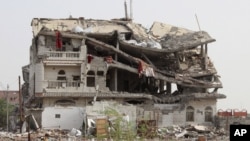Five countries — Libya, Sudan, Syria, Ukraine, and Yemen — have used cluster munitions this year, causing unacceptable harm to civilians, according to Human Rights Watch. The rights group wants an end to the use of the weapons, which are banned under the 2008 Convention on Cluster Munitions. Officials commented during the release of an annual report by [the Cluster Munition Coalition], a group of NGO's co-founded by Human Rights Watch.
Cluster bombs were dropped on two locations in Libya early this year, according to Cluster Munition Monitor 2015. It says Sudan’s armed forces air-dropped cluster bombs in Southern Kordofan province in the first half of this year and in 2012.
The monitor finds Syrian government forces began using air-dropped cluster bombs in mid-2012 and cluster munition rockets in attacks are believed to be continuing. It documents nearly 2,000 civilian casualties, but believes the number is higher. The report says the Islamic State militant group used cluster munition rockets during its advance on Kobane in northern Syria at the end of 2014.
The report says Ukrainian government forces and Russian-backed anti-government forces used cluster munition rockets in the Donetsk and Luhansk provinces of eastern Ukraine in 2014. It adds no attacks have taken place since a February cease-fire.
Human Rights Watch advocacy director Mary Wareham contributed to the report. She says Saudi-led coalition forces used cluster munition rockets in at least seven attacks in Yemen’s northwestern Hajja governorate, killing and wounding dozens of civilians.
She tells VOA in many cases, the submunitions did not detonate after being dropped by aircraft.
"And the villagers had collected them and were giving them to our researchers. Our researchers went to the location where the strike happened on the road, looked at the pasture across the road, looked in the bushes and found another canister," Wareham said. "So, we see the use of cluster munitions by the Saudi-led coalition in Yemen as being clear and compelling evidence..."
Human Rights Watch says submunitions typically fail to explode on impact, leaving duds that act like land mines until cleared and destroyed.
None of the five countries mentioned in the report signed the treaty banning cluster munitions. Advocates of the ban on such weapons note 117 countries have either ratified or signed it.
The monitor reports treaty member states have destroyed 1.3 million cluster munitions and 160 million submunitions, representing around 90 percent of declared stockpiles.










